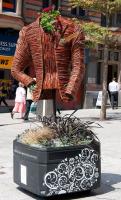 Add My Company
Add My Company
Sign In
Flower power on the high street
12-12-2014

Patience Atkinson-Gregory explains how local authorities use floral displays to boost the local economy.
We all know that appearances are important. There can be few more depressing sights than a deserted high street with boarded up shops and litter everywhere. In fact, an attractive commercial centre or high street is vital to attracting prosperity - which is one of the reasons why local authorities invest in floral displays. Ultimately, an investment in communal landscaping is also an investment in the community.
Flowers in the city
One local authority which recognises the importance of bringing horticulture to the built environment is Nottingham City Council. Ranked the 13th most deprived local authority area in England according to the Index of Multiple Deprivation, the city has some significant social and economic challenges. However, the council is firmly committed to maintaining floral displays as much as budget allows with the Parks and Open Spaces team looking after 136 parks and gardens across the region.
One of the team’s aims is to offer a wide range of attractions to entice visitors to the city, including floral displays in public spaces. With this in mind, a highly successful floral initiative was launched during the summer of 2011 in the form of a retail flower trail which linked the city's main shopping areas.
Bringing businesses on board
The initiative was jointly sponsored by the Retail Business Improvement District (BID) and the city council as part of the Nottingham in Bloom campaign with the goal of encouraging visitors to the city's shopping centres. The trail consisted of specially designed willow sculptures with surrounding floral displays in metre square containers placed around the city centre. The trail was a key factor in achieving both a Judges’ and Gold Award in that year’s Britain in Bloom, as well as taking the title for East Midlands in Bloom ‘Best Large City’. In their report, the judges commended the trail praising “the innovative floral sculpture trail in the city centre which has features appropriately placed to correspond with the retail outlets.” The Civic Society also presented the floral trail with a Civic Award in recognition of the positive effect that it had upon the area.
Making the city a better place
Keen to evaluate how successful the initiative had been, NCC also carried out a survey of shoppers and their response to the trail. The survey found that 71% of visitors reported that it had enhanced their shopping experience in a variety of ways, including creating a more peaceful atmosphere, improving their mood and making the overall experience more pleasant. 60% said that they would bring visitors to the city specifically to see the floral trail and almost half said the trail would encourage them to visit Nottingham again. The initiative also generated a lot of positive free publicity for the city.
“The introduction of Business Improvement Districts has been positive for the city,” comments Caroline Elmhirst, Nottingham in Bloom Partnership Manager. “The BID looks set to become increasingly involved in the Britain in Bloom competitions because trades and businesses realise that consumers are more likely to visit or use them if the surrounding area looks attractive.”
In addition to the floral trail, which has been repeated several times since its introduction in 2011, the council use planters and three tier planters to create attractive displays in commercial areas as well as barrier baskets on railings along traffic routes.
The self-watering solution
Maintenance costs continue to be an issue for councils, In Bloom groups and other organisations who need to manage their limited resources as cost effectively as possible. Apart from the plants themselves, which can often be grown relatively cheaply, maintenance in the form of labour costs is a substantial expense. One way that many local authorities have addressed this issue is through the use of Amberol’s self watering containers which need watering only once a week, as opposed to daily visits during the summer months. These specially designed containers, used by Nottingham and numerous other local authorities across the UK, have a built in water reservoir with a series of capillaries to ‘suck’ up the water which is dispersed via an expander pad. Because the water is stored under the soil, it doesn’t evaporate, meaning that maintenance crews can reduce their visits.
As many local authorities can testify, the investment in floral and public displays is repaid in so many ways - not just financial. We all want somewhere pleasant to live, work and visit - and community horticulture plays a significant part in achieving just that.
For more information on Flower power on the high street talk to Amberol Ltd
Enquire Now
List your company on FindTheNeedle.

